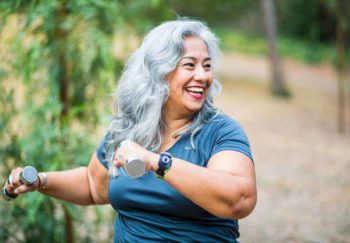As a health blog reader, you likely already know that a good's night sleep and a daily walk are both great for your health. But if you, or a loved one, are facing a big cancer surgery in the coming weeks, these 2 simple things could make a big difference in your recovery.
It could mean a long and difficult recovery vs a shorter, complication-free one.
So how much sleep and how many steps do you need before cancer surgery? Research led by a UVA Health colorectal surgeon shows us. And with wearable activity trackers like smart watches, it's easy to track these key measures.
Get 5,000+ Steps/Day for a Better Recovery From Surgery
In their study, the researchers had about 100 UVA Health colorectal cancer surgery patients wear Fitbits 30 days before surgery.
The researchers then looked at the data tracked by the Fitbit and put patients into 1 of 2 groups: active (got 5,000 or more steps each day) or inactive (got under 5,000 steps each day).
"In this study, we showed that those who were more physically active, as tracked by the Fitbit, had much lower complication rates after surgery,” says colorectal surgeon Traci Hedrick, MD.
The researchers also found that more active patients were less likely to need to go back to the operating room. They published these results in Surgical Endoscopy, a medical journal.
Hedrick led the study and is passionate about preparing her patients for an easier recovery. It was one of her grateful patients who funded this and another study looking at sleep and surgery recovery. “It’s pretty remarkable that these studies are being funded by a patient with cancer to help other future patients with cancer," Hedrick says. Learn more about donating to cancer research.
Less than 1 Hour REM Sleep Could Make for a Harder Recovery From Surgery
Looking at sleep patterns tracked by the Fitbit, the researchers also found the amount of REM (rapid eye movement) sleep in the week before surgery made a big difference when it came to recovery from surgery.
In the week before surgery, those who averaged less than 1 hour of REM sleep had much higher rates of complications after surgery and were more likely to return to the hospital.
Dive deeper on these results published in Surgical Endoscopy.
Clinical Trial Tests Impact of Exercise Before Surgery
Building on these findings, Hedrick and her research colleagues launched a clinical trial to see if an exercise program in the weeks before surgery can help improve recovery from surgery. The trial will enroll UVA Health patients who need surgery for colorectal, liver, gynecologic, or other types of abdominal cancer.
Facing Cancer?
UVA Health has Virginia's only Comprehensive Cancer Center.
Everyone enrolled in the trial gets to wear an Apple smart watch. Participants are assigned to 1 of 3 groups: maintain current activity; increase activity to 5 days a week, 40 minutes a day, of continuous moderate activity; or increase activity to 5 days a week, 40 minutes a day, of intervals of moderate and vigorous activity.
The clinical trial isn't done, but early results are promising. Hedrick says, “More exercise before surgery has the potential to shorten the recovery from surgery, or keep patients from needing to go to a skilled nursing facility after surgery.”
She adds, “Traditionally, we've used rehabilitation after surgery to try to help patients get their strength back. We're focusing on physical therapy-type activity ahead of surgery. Our goal is to better prepare them for surgery, similar to training for a marathon.”
Get details about this clinical trial.

